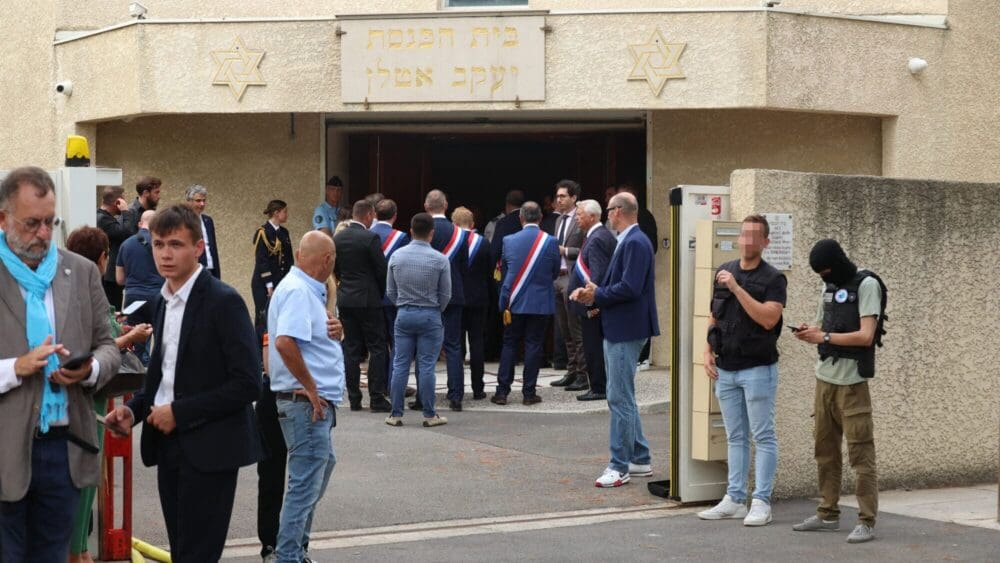
The synagogue in La Grande-Motte
Pascal GUYOT / AFP
On Saturday, August 24th, an attack targeted a synagogue in La Grande Motte, a popular seaside resort on the Mediterranean. A criminal broke into the sacred building, where a gas cylinder was opened, followed by two fires outside. Over the weekend, there was a succession of political reactions, with part of the French left denying that the attack was antisemitic.
On Saturday morning, a fire broke out at the Beth Yaacov synagogue. On arrival on the site, firefighters and police discovered several vehicles in flames. A violent explosion threw a policeman to the ground.
Interior Minister Gérald Darmanin quickly confirmed the criminal nature of the attack and expressed his support for the Jewish community. Four hours after the explosion, the investigation was handed over to the national anti-terrorist prosecutor’s office.
Only five people, including the rabbi, were in the synagogue at the time. The Shabbat service was scheduled for 9 a.m., but the assailant obviously got the time wrong. The “anti-Semitic attack” could have turned into an “absolute tragedy” if the worshippers had been there, said the outgoing Prime Minister, Gabriel Attal, who visited the site a few hours after the event.
Images of the perpetrator were recorded by the town’s surveillance cameras. They show an Arab-looking suspect wearing a Palestinian flag tied around his waist, a keffiyeh on his head and a handgun in his belt. He was holding a bottle of water, probably filled with petrol.
On Saturday evening, after a manhunt leading to the sensitive Pissevin district of Nîmes, known for its violence and trafficking of all kinds, the suspect was arrested just before midnight by police officers from the elite Raid unit. The police had to open fire to arrest the individual, who was holed up on the top floor of a tower block. The man was Algerian and legally resident in France. Four members of his entourage were also taken into custody.
French politicians reacted en masse to condemn the antisemitic attack. Jean-Luc Mélenchon, President of the far-left France Insoumise, caused controversy with a post on X, which mentions neither the word antisemitism nor the word Jew.
Incendie criminel contre la synagogue de La Grande-Motte. Intolérable crime. Pensées pour les fidèles et les croyants ainsi agressés. La laïcité et la liberté de conscience est fille de la liberté des cultes. Nous ne l'oublions jamais.
— Jean-Luc Mélenchon (@JLMelenchon) August 24, 2024
This questionable choice drew the ire of Mélenchon’s allies within the New Popular Front coalition. Marine Tondelier, leader of the Greens, criticised his communication, as well as his statement a few months ago that antisemitism was “residual” in France.
Fabien Roussel, general secretary of the Communist Party, had some unambiguous words for his part: “Antisemitism is on the rise in France, and it has struck again in La Grande-Motte. The perpetrators of this act must be identified and punished. Solidarity with our Jewish compatriots,” he posted on X.
On the Right, Marine Le Pen denounced an act that she saw as a consequence of the rise of anti-Semitism in France.
La synagogue Beth Yaacov de la Grande-Motte a été visée ce matin par des attaques criminelles. Ces attaques inacceptables et inqualifiables sont la conséquence de la montée de l’antisémitisme qui se répand dans notre pays.
— Marine Le Pen (@MLP_officiel) August 24, 2024
Tout doit être fait pour protéger nos compatriotes de…
Valérie Pécresse, chairwoman of the Ile-de-France region and close to the Les Républicains party, believes that “those who for months have been multiplying verbal outrages against our compatriots of the Jewish faith in public debate bear a heavy responsibility for the explosion in antisemitic acts.”
Since the events of October 7th, the climate for Jews in France has become particularly heavy, while antisemitic acts are exploding. According to the Ministry of the Interior, antisemitic incidents have almost tripled since the start of the year, with “887 incidents” recorded in the first half of 2024, compared with 304 during the same period in 2023. They had already risen sharply in 2023, particularly after 7 October, with 1,676 acts, “i.e. four times more than in 2022,” reports the newspaper Les Échos.
In an interview with La Tribune, Simone Rodan Benzaquen, European Director of the American Jewish Committee, said that today “the future of Jews in France is in question.” Daniel Halevy-Goetschel, Minister-Counsellor at the Israeli Embassy in France, says he has noticed “an increase in the statistics of people who want to emigrate to Israel because of the precarious situation, as they feel it, in France at the moment.” The Minister-Counsellor added that Israel was following the ups and downs of the formation of the new French government very closely: “France chooses its elected representatives and the Israeli government will decide at the appropriate time what attitude to adopt towards this or that government,” he told France info: A thinly veiled way of expressing his concern about the possibility of a left-wing government with ambiguous positions on antisemitism.
